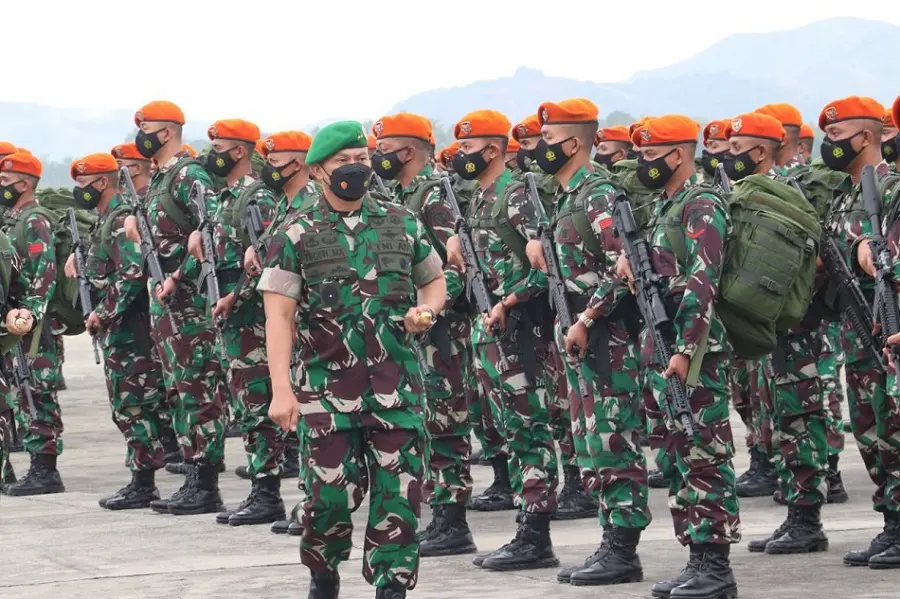
Personnel of the Army Special Forces Command (Kopassus), as part of the elite unit of the Indonesian Army (TNI AD). Known as an elite force within the Indonesian military, they often operate within civilian areas as well (Photo courtesy).
THE RATIFICATION of the revised Indonesian National Armed Forces Law (UU TNI) in March 2025 by the Indonesian House of Representatives (DPR RI) has sparked significant debates, particularly regarding its impact on the military’s role in government, its influence on civil society, and the potential for curbing democratic space in Indonesia.
One of the main focal points of this revision is to enhance the military’s role in civil affairs and national security, which has resulted in an increased military presence in areas such as Papua (West Papua). This development has significantly worsened the social, political, and human rights situation in Papua, a region that has long been mired in tension and conflict.
Alongside the ratification of the new TNI Law, the mobilization of military forces in Papua has intensified. In recent years, the Indonesian government has bolstered its military presence in the region by establishing several TNI command centers and deploying non-organic troops to the area.
For example, in the Sorong region of the Southwest Papua Province, the military’s presence was marked by the placement of the 3rd Kostrad Infantry Brigade, the Indonesian Air Force’s III Air Operations Command in Segun, and the Indonesian Navy’s III Fleet Command in Katapop, as well as the addition of other military bases across various regions of Papua. This situation highlights the significance of Papua as an integral part of the central government’s policies (Kusnanto, 2021).
These military installations are expected not only to safeguard against internal threats but also to protect the increasingly developed natural resources and strategic infrastructure in Papua. Under President Jokowi’s administration, Papua has become the focus of several large-scale projects, such as the construction of ports, airports, and mining facilities. These projects require military protection to ensure the stability and smooth operation of these ventures (Mukti, 2023).
However, despite the official narrative of ensuring security and stability, the military presence in Papua often exacerbates social tensions. The indigenous Papuan population, long suffering from injustice and increasing marginalization, is now further suppressed by the militaristic approach adopted by the state under President Prabowo Subianto’s leadership. This has further strained relations between the Indonesian government and the Papuan people, fostering a growing distrust regarding the government’s commitment to resolving issues in the region (Hewitt, 2019).
Military Mobilization, Conflict, and the Struggle for Natural Resources in Papua
From the non-organic military deployments in Papua, several areas have been designated as Military Operations Areas (DOM), although the Indonesian government justifies this policy as a means to support development.
The regions that have become military mobilization zones and are perceived as military operation areas include Nduga, Puncak Jaya, Intan Jaya, Yahukimo, Mimika, and Maybrat. According to Jakarta’s rationale, the military’s non-organic presence in Papua serves the following purposes:
First, maintaining national security and stability. The Indonesian government claims that deploying military forces in Papua is necessary to safeguard the nation, particularly in facing the West Papua National Liberation Army (TPNPB) or other social conflicts.
Second, securing strategic infrastructure, which is now referred to as the National Strategic Project (PSN). Under Jokowi’s administration, Papua has seen the construction of various infrastructure projects, such as ports, airports, and mining facilities. Military forces are stationed to protect these infrastructures from security threats, necessitating the expansion of military bases in the region.
Third, border surveillance. Papua shares a border with neighboring Papua New Guinea. The military is deployed to monitor the border and prevent illegal activities such as smuggling and terrorism.
Fourth, securing natural resources. Papua is rich in natural resources such as oil, gas, and minerals. The military is placed in areas where these resources are exploited, such as at companies like PT Freeport in Timika and LNG Tangguh in Bintuni, to protect these assets from security threats.
Despite these justifications, the mobilization of non-organic military forces in Papua has also attracted criticism and controversy. Many argue that the military’s presence could worsen security conditions and provoke conflict with local communities. There are also concerns that the military might be used to protect the economic and political interests of the Indonesian government, rather than prioritizing the rights and interests of local communities.
Regarding the unstable security situation, the military itself has contributed to the problem, as evidenced by the extrajudicial killings of two civilians, Kesya Lestaluhu and Abner Kareth, in Sorong. Kesya Lestaluhu was killed on January 12, 2025, while Abner Kareth died on February 16, 2025. These incidents, occurring within a month, add to the long list of extrajudicial killings in Papua that have yet to receive justice.
According to Amnesty International, these extrajudicial killings by the TNI and Indonesia National Police (Polri) personnel in Papua reflect serious human rights violations. Amnesty’s data recorded 132 cases of extrajudicial killings in Papua between 2018 and 2022, leading to the deaths of 242 civilians. To date, none of these cases have been fully investigated through an independent and impartial legal process.
Furthermore, the violence, torture, arbitrary arrests, and impunity in these cases indicate a systemic failure in law enforcement and oversight of security forces in Indonesia. Military violence in Papua is not an isolated event but a structural crime deliberately maintained by the state.
The Papuan people must not grow accustomed to silence in the face of these crimes. Therefore, it is crucial to increase public awareness and encourage participation in the fight against ongoing injustices.
Military Domination, Suppression of Democracy, and Human Rights Violations
The ratification of the new TNI Law has granted the military greater involvement in governance, which risks reducing civil liberties and undermining democratic principles. The military’s role in security policies, often involving harsh measures, threatens to worsen the state of democracy in Indonesia.
According to AG Hoed (2020), strengthening the military’s role in political decision-making leads to an unclear division of responsibilities between military and civilian institutions, which could ultimately result in a more authoritarian and less transparent government. When the military begins to infiltrate civilian sectors, as seen with the TNI’s involvement in infrastructure management and economic policy oversight, there is a significant risk of power becoming concentrated in the hands of the military.
This, according to Pratama (2022), could erode the independence of civil institutions and damage the foundations of Indonesian democracy. Important decisions should be made by civil officials who are responsive to the community’s needs, not by TNI officers focused on national defence.
One of the most evident impacts of the military’s increasing presence in Papua is the reinforcement of militarization, which risks exacerbating the region’s social and political problems. Violence against civilians by military personnel is not a new phenomenon, but this pattern is spreading with the growing number of non-organic troops, who are not connected to the local community.
This violence is not a random occurrence but a manifestation of the state’s policy to prioritize a militaristic approach to resolving social tensions. “Violence in Papua is not just an individual issue but a structural problem maintained by the state” (Kusnanto, 2021).
This pattern of violence has deepened Papuans’ distrust of the Indonesian government, which is seen as prioritizing political and economic interests over the fundamental rights of the Papuan people. The militaristic approach and the exploitation of natural resources have reinforced the belief that Indonesia is implementing a classic colonial policy in Papua.
Building Collective Awareness and Civil Society Participation
Amid the increasing militarization and human rights violations in Papua, one of the greatest challenges is raising awareness among Papuans and encouraging active participation in the fight for their rights. The Indonesian government, together with international institutions, must increase efforts to protect the basic rights of the Papuan people and create space for them to participate in decision-making processes that shape their future.
The Papuan people must be given the opportunity to voice their aspirations without fear of retaliation or repression from security forces. This includes ensuring freedom of speech, freedom of assembly, and freedom of association. It is crucial to ensure that Papua is not only an object of state policy but also a subject with a voice in determining the direction of development and peace in the region (Pratama, 2022).
The ratification of the new TNI Law and the increased military mobilization to Papua have had a significant impact on the military’s role in government, civil society, and the democratic climate in Indonesia. While the government justifies these actions as efforts to maintain stability and security, the militarization process has undeniably strained relations between the government and the Papuan people and worsened human rights violations.
It is essential for the Indonesian government to ensure that security efforts do not come at the expense of the civil liberties and democracy that have long been fought for. As a democratic country, Indonesia should ideally be able to strike a balance between law enforcement and respect for human rights while providing space for Papuans to participate in the democratic process, including determining their own fate and future (the right to self-determination).
Stricter oversight of military actions and independent resolutions of human rights violations are necessary to prevent impunity and the abuse of power that are increasingly undermining the foundations of democracy in Indonesia.
(*) Apei Tarami is the author of this article, written through a writing workshop facilitated by Avaa Foundation (March 2025). He is a Papuan activist based in Sorong.






